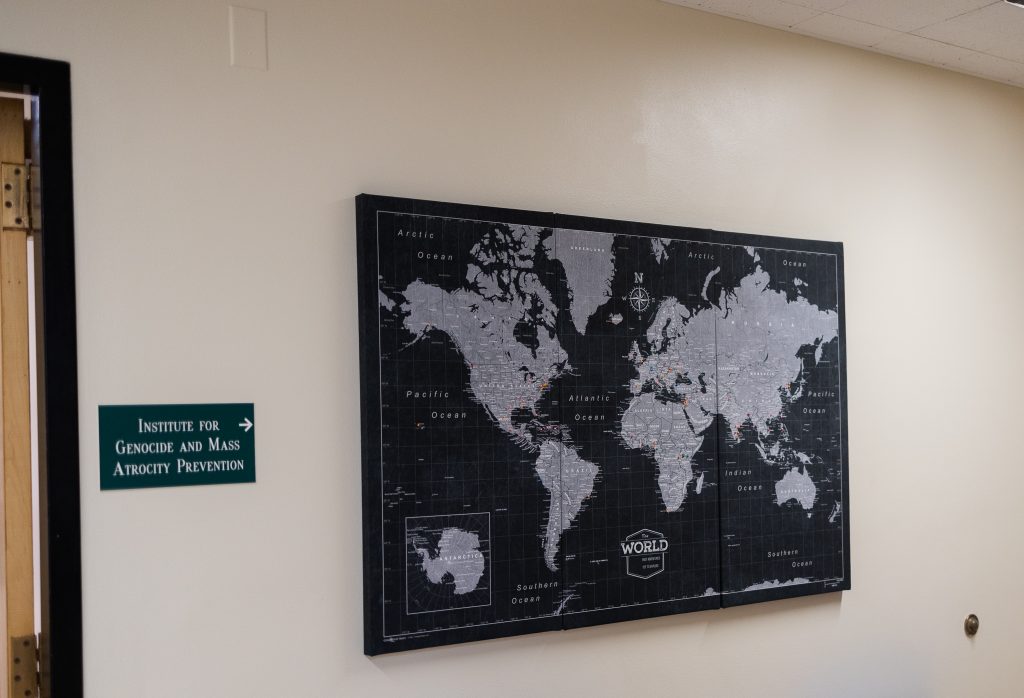To discuss the publication of a policy report to protect Venezuelans in Colombia from identity-based violence, the Institute for Genocide and Mass Atrocity Prevention hosted a webinar last Wednesday.
The online event, “Safer Havens: Better Protection of Venezuelans in Colombia from Identity-Based Violence,” provided a forum to discuss this report, which was developed during the first of three planned annual workshops in the Safer Havens project, conducted by the Auschwitz Institute for the Prevention of Genocide and Mass Atrocities and I-GMAP. Safer Havens works to recognize the risks of identity-based persecution and serious human rights violations in certain countries while achieving better policy strategies “to protect displaced populations from the risks of identity-based violence in their receiving countries.”
I-GMAP co-director Max Pensky briefly introduced himself, and then three guest panelists were invited to the talk, including Maria Eugenia Carbone, director of the Latin American Program for the Auschwitz Institute. Carbone joined the group in 2013 and has also served as the technical secretary of the Latin American Network for Genocide and Mass Atrocity Prevention. She was joined by Ana María Diez, the co-founder and president of Coalición por Venezuela, a group of civil society organizations that represent the needs of Venezuelans on the local and global stage. Maritza Mosquera Palacios, another guest panelist, is the secretary of social integration at the mayor’s office in Bogotá.
“We want to share with you the results, the findings of the workshop, and of course the report that we are launching today that is a result of a partnership between I-GMAP and [the Auschwitz Institute], where we provided elements from the field of prevention of atrocities to identify the risks that affect the migrant population of Venezuelans so that we can jointly establish actions to mitigate those risks,” Carbone said. “This was inspired by a reality that we heard during the workshop, which is the urgent need to have better protections for the Venezuela migrant population. We know that there are over seven million people who have fled Venezuela in the past 10 years and all of this has been caused by the deep social, political and economic crises and mass violations to human rights caused by the regime of Nicolás Maduro.”
Venezuelan President Hugo Chavez’s death and the installation of his successor, Maduro, in 2013 has led to ongoing hyperinflation, severe shortages of food and medicine and voter suppression following two purportedly rigged elections. The recent wave of Venezuelan migrants to Colombia stems largely from these developments. While Colombia has implemented progressive policies, providing 10-year residency permits and access to work and education, many migrants have faced workplace discrimination and are at risk of identity-based violence.
Panelists offered further insights to emphasize the need for countries to put forth new policies to cope with large, displaced populations.
“We also see identity-based violence when people perceive an accent when you speak,” Palacios said. “Colombia has different regions, and when you speak, people know if you’re from the north, from the south, from the Pacific, from the coast, from the east — so people would detect an accent, and hearing that accent would lead people to be rejected [from buying a home] and it led to fragmentation — ‘oh no, we’re not renting to migrants,’ for example, [or] ‘we’re not renting to Venezuelans.’ That was an additional hurdle for migrants, and many people wanted to live peacefully, but they had to face significant hurdles.”
One audience member asked during the Q&A session about actions taken to combat xenophobia and discrimination against Venezuelan migrants. Diez described three basic steps that can be taken to challenge the negative stereotypes and intolerance migrants face.
“We’ve tried to create awareness in the government that anything they say or any decision taken can impact thousands, if not millions, of people, which is advocacy work that we all have to do, everyone,” Diez said. “Organizations of Venezuelans, Colombians and other nationalities should do this and that’s the first mitigation step. Second, when things are out of hand, we have to show what’s untrue. In elections, candidates usually use the migrants as the person who’s going to take away from you, your job or who’s coming to commit crimes. We have to fight that misinformation — that’s crucial, so that people can take their own decisions that are pondered and [become] aware of the impact this will have. Third, awareness campaigns doing the work we do which benefits all of us and not just Venezuelans.”
The second workshop of the Safer Havens project is expected to take place in Kenya in 2024 and will later be followed by a third and final workshop in Romania.



